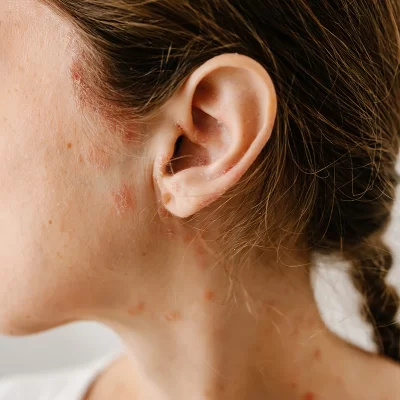Psoriasis on the face
- What is psoriasis on the face and what are its causes?
- What are the symptoms of psoriasis on the face?
- How is psoriasis on the face diagnosed?
- What are the treatment methods for psoriasis on the face?
- How to care for facial skin affected by psoriasis?
- What diet to follow for facial psoriasis?
- What complications can psoriasis on the face cause?
What is psoriasis on the face and what are its causes?
Psoriasis on the face is a chronic and often recurring skin disease, classified as an autoimmune dermatosis. Its cause is the improper functioning of the immune system. In the course of the disease, T lymphocytes attack the skin's own cells, causing inflammation. As a result, skin cells multiply too quickly, with cytokines playing a crucial role in the entire process.
Genes play a major role in the development of psoriasis, which is why this disease is often hereditary. However, numerous external factors can also influence its progression:
-
strong or chronic stress,
-
infections,
-
skin injuries,
-
hormonal changes,
-
unhealthy lifestyle, e.g., smoking or excessive alcohol consumption.
Symptoms of psoriasis on the face result from an inflammatory condition that causes rapid growth of skin cells. Characteristic red patches appear on the skin, which can form bumps and then transform into scales. Usually, they are covered with a silvery, sometimes reddish, scale.
These eruptions often cause a range of unpleasant symptoms:
-
intense itching,
-
burning sensation,
-
pain,
-
dry skin,
-
irritation,
-
burning feeling.
The eruptions are usually located on the forehead, cheeks, eyelids, and around the mouth. While the most common form is plaque psoriasis, more severe types of this disease can also appear on the face. Pustular psoriasis is characterized by pus-filled blisters, and erythrodermic psoriasis causes extensive redness of the skin.
A dermatologist diagnoses psoriasis on the face during a visit, carefully evaluating skin symptoms and their location. An important part of the diagnosis is also a family history interview. A crucial element is the differential diagnosis, which helps to exclude other conditions.
Psoriasis should be distinguished from seborrheic dermatitis (SD), characterized by greasy scales and excessive sebum secretion, often caused by the yeast Malassezia. It is also necessary to rule out atopic dermatitis (AD) - often associated with a compromised skin barrier and allergies. If the diagnosis is difficult, the doctor may order a skin biopsy (histopathological examination). Sometimes, vitamin D level analysis is performed as an auxiliary measure.
Treatment of facial psoriasis requires a comprehensive approach tailored to the severity of symptoms. It includes both local and systemic therapies, often supported by complementary methods.
For local therapy, corticosteroid ointments are used. For delicate facial skin, calcineurin inhibitors such as tacrolimus or pimecrolimus are particularly recommended. Preparations containing vitamin D (e.g., calcipotriol) and retinoids are also effective.
In advanced cases, systemic therapy is necessary. This includes immunosuppressive drugs (e.g., methotrexate, cyclosporine) and oral retinoids (e.g., acitretin). Modern biologic medications, such as ustekinumab and adalimumab, which precisely target inflammatory processes, hold great promise.
Complementary treatments include supportive therapies like phototherapy (including LED light and photochemotherapy) and medical peels. Functional medicine and phenotypic therapies are also gaining importance, providing comprehensive support in the fight against the disease.
Daily facial care is crucial in alleviating symptoms of psoriasis. Choose hypoallergenic products for skin cleansing. Then intensely moisturize the skin by using emollients that will help rebuild its protective barrier. Look for cosmetics and dermocosmetics containing:
- hyaluronic acid,
- glycerin,
- urea,
- panthenol,
- allantoin,
- niacinamide.
Natural oils such as:
- avocado oil,
- coconut oil,
- tea tree oil,
- hemp seed oil,
- sea buckthorn oil,
- evening primrose oil,
- sweet almond oil, are excellent for skin care support.
Additionally, helpful ingredients may include shea butter, aloe, and pumpkin seed extract.
Remember also about sun protection and use cosmetics with UV filters. Always remove skin exfoliation gently to avoid irritation.
Diet plays an important role in the treatment of psoriasis, helping to reduce overall inflammation in the body. A healthy anti-inflammatory diet is essential, rich in omega-3 fatty acids (e.g. from fatty fish) and antioxidants (found in fresh fruits and vegetables).
It is also extremely important to supplement any deficiencies of vitamins and minerals. These essential nutrients can be obtained through a well-balanced diet or, if necessary, through targeted supplementation:
-
vitamin A,
-
vitamin E,
-
vitamin D,
-
vitamin B,
-
zinc,
-
selenium.
It is worth considering various dietary models. The Mediterranean diet, gluten-free, ketogenic, or vegetarian diets may be helpful, however, their effectiveness always requires individual assessment and adaptation to the specific case.
Psoriasis on the face is not just a matter of aesthetics, but above all a serious health challenge. Damaged skin becomes particularly susceptible to bacterial infections. Disease-related changes on the eyelids are especially dangerous, as they can lead to serious eye problems such as conjunctivitis or eyelash loss. Similarly, eruptions around the ears can negatively affect hearing.
In addition to physical ailments, psoriasis significantly burdens mental health. Patients often experience strong stress, lose self-confidence, and are even more prone to depression or anxiety attacks. In difficult situations, the help of a psychologist and psychotherapy proves invaluable.
Effective treatment and proper skin care are the foundation that not only prevents serious complications but also minimizes the risk of disease recurrence.
